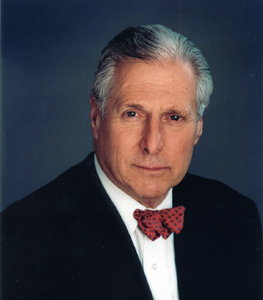|
Contact: Charles R. Loebbaka at 847/491-4887 or at |
Landsberg to Step Down as Dean of Feinberg School of Medicine and Vice President For Medical Affairs at Northwestern
 CHICAGO—Lewis Landsberg, MD, has announced that he will step down as dean of the Feinberg School of Medicine and vice president for medical affairs at Northwestern University effective July 1, 2007.
CHICAGO—Lewis Landsberg, MD, has announced that he will step down as dean of the Feinberg School of Medicine and vice president for medical affairs at Northwestern University effective July 1, 2007.
Provost Lawrence B. Dumas said, “President Bienen and I accepted his decision with regret and with enormous gratitude for all he has done to strengthen the school in his eight years as dean and vice president. The Feinberg School achieved new heights in every aspect of its mission.”
“Dr. Landsberg established a vision of excellence for the school,” said President Henry S. Bienen, “recruiting outstanding faculty leaders, increasing research funding, and establishing outstanding educational programs for students. He leaves an important legacy at Feinberg and, by extension, at Northwestern University as a whole.”
In announcing his plans to Feinberg chairs, Dr. Landsberg stressed that “there is a time in life for everything” and that “the time had come to pass the baton to a new generation of leaders.” He said his plans are to take a sabbatical, establish a center for the study of obesity, teach, and continue to conduct hypertension-related research.
Dr. Landsberg was appointed interim dean of the medical school in August 1999 and was named dean and vice president in April 2000. He had previously served as the Irving S. Cutter Professor and chair of the Department of Medicine at the Feinberg School and chief of the medical service at Northwestern Memorial Hospital.
“In each of these important positions, Dr. Landsberg has distinguished himself and worked tirelessly—and effectively—to help make Northwestern’s medical school an international leader in clinical practice, medical education, and research,” Dumas said. “He brought to Northwestern national recognition in academic medicine as a ‘triple threat’—an outstanding clinician, a dedicated teacher, and a researcher whose work in the field of hypertension earned him an international reputation.”
Dr. Landsberg was recruited in 1990 from the Harvard Medical School, where he served as professor of medicine and chief of the endocrinology division at the Beth Israel Hospital. He had received training at the Yale University School of Medicine and the National Institutes of Health and served as a member of the Yale faculty.
Dumas noted that Dr. Landsberg recruited 17 department chairs and eight center or institute directors and created three new centers and one new institute. The number of tenure track faculty members has increased from 271 to 332 and the number of full-time faculty members from 1,250 to 1,544.
Dr. Landsberg also has served as chairman of the board of the Northwestern Medical Faculty Foundation (NMFF), the school’s medical group practice, and initiated the revitalization of NMFF with the appointment of James L. Schroeder, MD, as president and CEO. They oversaw the opening of the ambulatory tower in the Galter Pavilion of the new Northwestern Memorial Hospital. Since 1999 NMFF revenues have more than doubled and last year generated $397 million in operating revenues—funds that pay the salaries and expenses of NMFF physicians who teach medical students and residents, treat patients, and conduct research. The faculty practice plan also transfers funds to the Feinberg School each year to support research and education activities and since 1999 has transferred $190 million.
Dr. Landsberg was instrumental in the development of a greatly enhanced and mutually supportive relationship with Northwestern Memorial Hospital, working closely on joint strategic planning.
Medical school research prospered under Dr. Landsberg’s leadership. Since 1999 the school’s funding from the National Institutes of Health (NIH) increased from $74.6 million to $123.8 million. It is currently ranked 34th in NIH funding, an increase of five positions since 2001. Total sponsored project awards for medical school faculty, including affiliated hospital-sponsored projects, has increased from $145 million to $277 million during Dr. Landsberg’s tenure as dean. Research space has grown by more than 70 percent, the Robert H. Lurie Medical Research Center was opened, and approximately $50 million was spent to renovate research space.
Educational programs have been enhanced, space dedicated for educational purposes has increased by more than two-thirds, and the number and quality of graduate and degree granting graduate programs have increased. Dr. Landsberg has served as chairman of the board of the McGaw Medical Center of Northwestern University, the consortium under which the medical school and the affiliated hospitals run one of the nation’s largest and most eagerly sought residency programs.
Dr. Landsberg’s leadership during Campaign Northwestern led the Feinberg School to reach $522.8 million in gifts and commitments, including a $75 million endowment from the late Reuben Feinberg of the Joseph and Bessie Feinberg Foundation. In recognition of the foundation’s total donations of $103 million, the medical school was named the Feinberg School of Medicine. Sixteen new endowed professorship positions were created and leadership gifts for the Robert H. Lurie Medical Research Center were made by donors including Ann Lurie, Patrick and Shirley Ryan, Northwestern Memorial Hospital, and the Avon Foundation, among others. During the past seven years, the medical school’s endowment has increased from $685 million to more than $1 billion.





